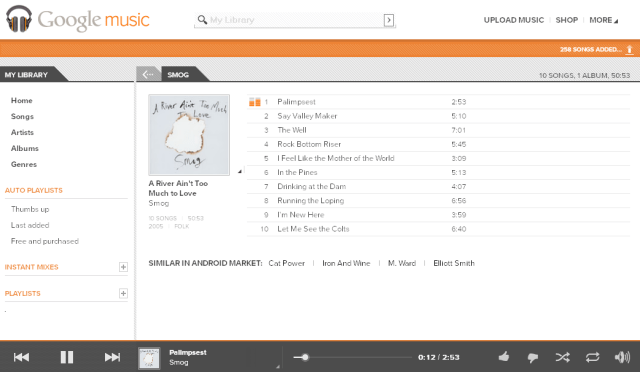The web is less than enthused by Google Music, which made its debut today with the usual fanfare. The criticism is withering in its somewhat entitled way: “Where’s the Spotify killer?” “Rdio already does this!” “So it’s basically iTunes match?”
There are two things the critics decline to acknowledge: that Google is providing a simple, free service, and that all Google products start out underwhelming and gradually expand. Android was a mess when it showed up. And it’s still a mess — a mess blowing up to the tune of half a million devices a day. We all know Google doesn’t ship complete products. So why do we waste our breath in day-one aspersion or praise when it’s going to be a new Google Music down the line?
Exceptions abound, of course, but it’s flashy stuff like Wave that can’t really advance past its initial form and ends up getting rolled up. Music looks like it was put together in a month or two, and then Google spent the next year or so in meetings with music execs to get access to their content.
Google Music is more like GMail: it’s what you’ve already got, except it’s on their servers and you can access it anywhere. Webmail already existed at the time they came out with it, and GMail was competitive but hardly a quantum leap. And here’s Music: a locker for the MP3s you have, a simple interface, and a store with more or less the same selection and pricing as everyone else.
The thing is that iTunes, which grabbed the industry by the short hairs nearly a decade ago and has never let go, hasn’t really changed in all that time. I mean really, what’s different? The biggest change and perhaps the most important thing about it now is that it’s the go-between for iPhones and iPads. But it’s not like Genius and Ping have entered the zeitgeist, and as I wrote a long while back, the bloat of the program, when many simply want to play music, is out of hand. iCloud is nice, but as long as we’re talking about not doing new things, iCloud is Apple playing catch-up to Google and others.
The real competition is the next generation of music players, namely Spotify, Rdio, and the various minor players. Do you really think Google doesn’t have a plan for this — Google, which helped popularize cloud-based media in the first place from the beginning? I’m guessing it was in the negotiations but the labels didn’t like Google’s ideas for monetization. Google likes to give things away for free and let you pay by other means, usually ads. Does EMI really need another Pandora hanging around their neck?
And last but not least, there’s the Google “hang around” strategy, which is being implemented on practically every Google platform. Like Google+, which, whether you like it or not, you’re pretty much already on. Same with Music: you might not find it compelling today, but it’s there, it’s free, and you’re going to keep seeing it. And it’s going to keep getting better.
The quotation comes to mind: “If you sit by the river long enough, the bodies of your enemies will float by.” Of course, in tech, there are always enemies waiting downstream for your body to float by.
Two things, though, could kill it in the future. I’m worried that the increasing self-integration of pay services may attract the attention of antitrust-type investigation, something Google is always in the middle of. If they can’t use Search to point users towards their music service, that’s a major loss. The lack of a subscription-based or free streaming plan could also sink the ship. Google is trying to think of a way to give it all away for free. Unfortunately, they’re not giving away user-submitted content like on YouTube, so it’s not just a matter of logistics (Google loves logistics). Like Google TV, they may find themselves isolated from the content people want, and a simple music locker, while useful to some, isn’t going to pull in a lot of money or users.
Essentially all I’m saying is that Google views everything as a “slow and steady wins the race” type situation. When it tries to sprint ahead, it finds itself without peers, and lacking inspiration and things to improve on, these ambitious projects expire. But Google Music is far from ambitious. It’s a simple, familiar service with a nice little bit of bait to draw in the crowds. Who doesn’t want to back up their music on a free service, in case they decide they don’t like Apple or Spotify any more? Judging Google products on day one is a bad move whether you praise or criticize. We all know how bad Google is at providing complete products. I don’t know why they even have these events. Your best move, if the backup thing isn’t up your alley, is to revisit the service in six months and compare how far it’s moved with how far the competition has moved.
And hey, it’s free. That’s something, right?
